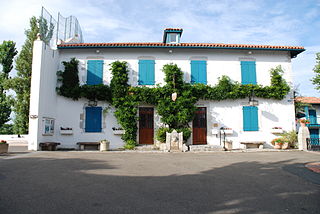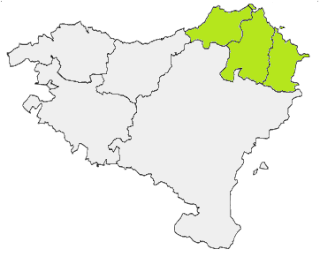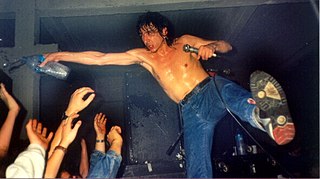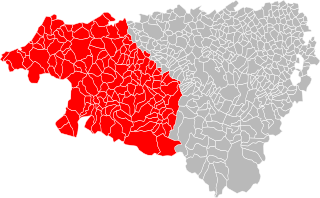
The Basque Country is the name given to the home of the Basque people. The Basque Country is located in the western Pyrenees, straddling the border between France and Spain on the coast of the Bay of Biscay.

Ahetze is a village and a commune in the Pyrénées-Atlantiques department in the Nouvelle-Aquitaine region in southwestern France. The commune is part of the urban area of Bayonne, and of the traditional Basque province of Labourd.

Arbonne is a commune in French Basque Country, a region of the Pyrénées-Atlantiques department in the Nouvelle-Aquitaine region of southwestern France.

Arcangues is a commune in the Pyrénées-Atlantiques department in the Nouvelle-Aquitaine region of southwestern France in what was formerly the Basque province of Labourd.

Ascain is a commune in the Pyrénées-Atlantiques department in the Nouvelle-Aquitaine region of south-western France.

Bardos is a commune in the Pyrénées-Atlantiques department in the Nouvelle-Aquitaine region of south-western France. It is part of the former Basque province of Labourd.

Saint-Pée-sur-Nivelle is a village and a commune in the Pyrénées-Atlantiques department in southwestern France. It is part of the traditional Basque province of Labourd.

The Bretons are an ethnic group native to Brittany, north-western France. They trace their heritage to groups of Brittonic speakers who emigrated from southwestern Great Britain, particularly Cornwall and Devon, mostly during the Anglo-Saxon settlement of Britain. They migrated in waves from the 3rd to 9th century into Armorica, which was subsequently named Brittany after them.

The French Basque Country, or Northern Basque Country, is a region lying on the west of the French department of the Pyrénées-Atlantiques. Since 1 January 2017, it constitutes the Basque Municipal Community presided over by Jean-René Etchegaray.
An ikastola is a type of primary and secondary school in the Basque Autonomous Community, Navarre and the French Basque Country in which pupils are taught either entirely or predominantly in the Basque language. Ikastolak can be nowadays either private or public, divided into different networks.

The Nivelle is a 39-kilometre (24 mi) long river French department of the Pyrénées-Atlantiques (France) flowing largely south-east to north-west, with only 7 km of its length being considered navigable. The river results from the union of various streams in Urdazubi (Navarre), going on to cross the Spanish-French border at Dantxarinea after 14 kilometres (8.7 mi) meandering across Navarrese soil. The river pours into the Bay of Biscay on the bay of Saint-Jean-de-Luz after cutting its way between this town and Ciboure on its final stage. At this point, celebrated Basque French composer and arranger Maurice Ravel was born in one of the front houses overlooking the channel.

Basque Radical Rock was a musical genre born in the Southern Basque Country at the beginning of the 1980s and, although there was no specific event, it is considered to have ended in the last years of the decade. Basque Radical Rock bands were particularly influenced by punk bands like Sex Pistols and The Clash. It was considered an underground movement, born in opposition to the values proclaimed by Francisco Franco and spread by thousands of people who felt with the Spanish transition to democracy their Basque national and social aspirations were betrayed.

Ibilaldia, meaning trip, journey, or march in English, is a festival organized every year the last Sunday of May or first of June to help the ikastolak in Biscay, Basque Country in Spain.
Kilometroak is a festival organized every year on the first Sunday of October to reach out to the ikastolas in Gipuzkoa, Basque Country, Spain.

The Basque Country is a cross-border cultural region that has a distinctive culture including its own language, customs, festivals, and music.
The canton of Ustaritz-Vallées de Nive et Nivelle is a canton of France, in the Pyrénées-Atlantiques department. Its chief town is Ustaritz.

Araba Euskaraz is the festivity that ikastola-s of Álava celebrate. The Ikastola-s' Association organizes it annually in mid-June, and it was first organized in 1981 in Vitoria, capital of Álava.

The communauté d'agglomération du Pays Basque, is the agglomeration community, an intercommunal structure, centred on the cities of Bayonne and Biarritz. Also referred to as the French Basque Country, or Northern Basque Country, it is located in the Pyrénées-Atlantiques department, in the Nouvelle-Aquitaine region, southwestern France.
Boiseko Ikastola is a language immersion preschool located in Boise, Idaho, United States. It is one of the few schools outside the Basque country to teach the Basque language.

Elbira Zipitria Irastorza (1906–1982) was an innovative Spanish-Basque educator who pioneered home schools as a means of reviving use of the Basque language at a time when it was prohibited. On returning to San Sebastián after the Spanish Civil War she taught young children in their own homes before creating the first ikastola or home Basque-language school in 1956. In the 1960s, 71 schools were created in the towns and cities of the Spanish Basque Country although they were still illegal. It was not until 1970 that official permission was granted for the opening of the Orixe Ikastola in San Sebastián. Zipitria was a member of various political and cultural organizations, including Emakume Abertzale Batza, Euskaltzaleak and Eusko Ikaskuntza.















